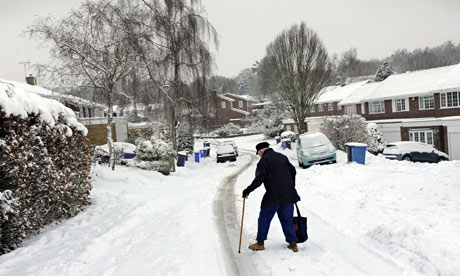
Even a small drop in temperature leads to an increase in the number of people who suffer a heart attack, say researchers.
Each fall of one degree Celsius at any time of year is associated with 200 extra people having a heart attack within the next 28 days, according to a study in the British Medical Journal.
More people tend to have heart attacks during the winter. Very cold temperatures are thought to affect the heart by increasing blood pressure and increasing the chances of the blood clotting.
Older people aged 75 to 84 – and those with existing heart conditions – are particularly vulnerable and should take steps to stay warm when temperatures drop, researchers at the London School of Hygiene and Tropical Medicine found.
Every year around 141,000 people in the UK have a heart attack, of whom 86,000 die, with one in three of them dead before they reach hospital.
Krishnan Bhaskaran, who led the research, said the findings meant that the sustained cold experienced in the UK last winter must have claimed an unknown but significant number of lives. "Given how cold it was in the UK, and our finding that a drop of several degrees over a prolonged period may result in a large number of extra heart attacks, [deaths were] probably running into thousands," he said.
He and his colleagues studied the records of 84,010 patients who were admitted to hospital with a heart attack in 15 places in England and Wales during 2003-2006, and factored in the daily temperatures in those areas and other potential explanatory factors, such as air pollution and levels of influenza.
"We can't prove that the cold causes the increases in heart attacks but even after controlling for those other factors we found that they still did not explain the link and therefore we were left with cold," he said.
However, the researchers found that those who took aspirin regularly had a reduced risk of a heart attack.
The British Heart Foundation said the study showed that those at risk of a heart attack during cold weather should take precautions, such as wrapping up warm and always wearing a hat to minimise body heat loss through the head. They should also avoid sudden exertion, such as clearing snow or pushing a car.
Bhaskaran said that an early warning system could be set up under which people at particular risk of a heart attack could be phoned, warned of a cold spell and offered advice. Such a system was already in place for some people with chronic obstructive pulmonary disorder, he added.
Dr Tim Chico, an honorary consultant cardiologist at the cardiovascular biomedical research unit at Sheffield University, said the study would not change the way he treated patients.
"Although interesting, the findings do not prove lower temperatures cause heart attacks directly, and I won't be telling my patients to do anything different during cold weather," he said.
He added that anyone concerned about having a heart attack should not smoke and should watch their weight and exercise more.

